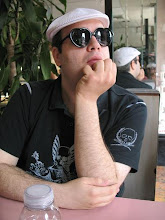One of the glorious things about living in NYC is the easy access to Strand Books and their $1 and $.50 close out specials. I've usually been able to find a number of things that I'm interested in reading or had heard about, and the ability to just pick up stuff on a whim is great.
Unfortunately the weather conspired against me by deciding that it did want to snow after all so I didn't get to spend a great deal of time browsing, but I still managed to snag some good deals.
There's no
guarantee that these will make it into the 52 books this year because I know for a fact that there are at least two that I'm giving right away.
The Fountainhead by Ayn Rand($.50) I snagged this because my girlfriend's roommate is a bit of a leftist/collectivist and I've been trying to teach her dog capitalism and how the invisible hand of the market can rub her belly and scratch behind her ears as easily as the roommate's real hand dispenses of her poop and that free markets lead to free puppies. Now I can leave the book in the dog's suitcase and we can hopefully lead the dog to being self sufficient. If I ever have kids I'm going to teach them to be
Randroids to get them out of the house and into the job market at age four.
Murder Ink by Dilys Winn ($1) This is an oversize and rather thick book from 1977 which is a collection of essays on the mystery genre written by several various prominent authors of the time period. From the introduction it looks like this aims to be about the "fun" of mysteries, so it looks like a reverent and gentle poke at some of the tropes of the mystery genre while also providing factual essays such as the history of the English police force, Scotland Yard, America's own
Pinkertons a history of cyphers and on and on. Oh, and the font is
Baskerville.
Hong Kong Babylon ($1) The famous 1997 book which was an
examination of the
HK film markets as kind of a primer for the third wave of
HK film making to expand knowledge on what little product had begun to seep through to American
consciousness. I have never read this book because I frankly never saw a need for it. By the time it had come out I was already well versed in
HK cinema and had seen a great deal of the "classic" films back when we had to pay exorbitant
amounts to
Tai Seng for often times horrible quality video tape transfers. When this book came out the DVD market had really started to take off so some
distributors like Mei Ah and Media Asia were able to get their discs to American shores. Tragically companies like Sony and
Miramax would pluck up the rights to the bankable stars and just butcher those films to try to
appeal to American audiences (for great horror, watch the Dimension films releases of Jet Li's movies) so if you were a purist you had to invest in a region free player and pay a lot for shipping to get these products directly from
HK. Thankfully the
Weinsteins have founded Dragon Dynasty which puts out far better product than
Miramax ever did. Still no uncut and subtitled Drunken Master 2 though.
The Manhattan Hunt Club by John Saul ($.50) I really like John Saul so it's always a treat to find another one of his books on the cheap.
From the Borderlands edited by Elizabeth E and Thomas F Monteleone ($.50) This is a horror anthology series which I've always enjoyed. Thomas
Monteleone can be a bit of an arrogant insufferable bastard when writing non-fiction (see his Mother and Father's Italian Association writing in individual issues of Cemetery Dance for example) but he has a great nose for stories and the Borderlands anthology is one I've always enjoyed. I first discovered the first volume in our barracks library in Military school where I was introduced to Thomas
Ligotti, Joe R
Lansdale (with the amazing story By
Bizarre Hands closing out the volume),
Bently Little (with a GREAT workplace horror story called The Pounding Room), Poppy Z
Brite, Chet Williamson and John Shirley. This one seems a little bit more mainstream at first, featuring works from Whitley
Strieber (best known for
Communion a non-fiction book wherein aliens steal Whitley away from his home), and Steven King (though King's short story work is usually pretty amazing), there are a number of authors whom I'm not immediately familiar with in the table of contents. A quick search through Amazon turns up a number of the first volume available on the cheap. I'll probably pick up a copy as it's been 18 years since I read it last.
The Mephisto Waltz by Fred Mustard Stewart ($.50) Known largely for the film which was basically a Rosemary's Baby copy, I had remembered reading that the book was fairly good. I can't find anything online to support this and indeed the books existence seems to have been completely overshadowed by the film. This, of course, only intrigues me further.
The Fellowship of the Ring - JRR Tolkien ($.50) First edition paperback from October of 1965 published by
Houghton Mifflin Company. I purchased for a guild member. Personally, I loathe
Tolkien's disingenuous pastoral nostalgia.


